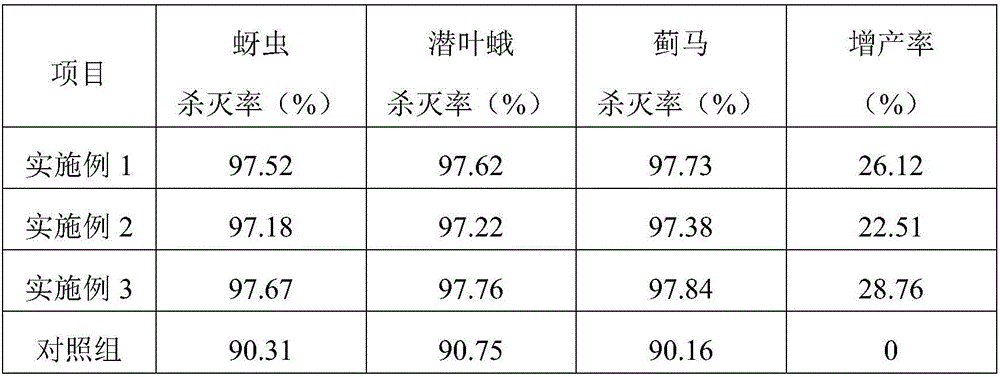Insecticide for sweet peas
A technology for pesticides and sweet beans, applied in the directions of pesticides, biocides, biocides, etc., can solve the problems of pest resistance, polluting the environment, unable to meet demand, and single function of pesticides. Promotion and application, low cost, good application effect
- Summary
- Abstract
- Description
- Claims
- Application Information
AI Technical Summary
Problems solved by technology
Method used
Image
Examples
preparation example Construction
[0045] The preparation method of described sweet bean insecticide comprises the following steps:
[0046] S1: Mix and pulverize purslane, kava pepper, tea tree leaves, Qinpi, Sophora flavescens, neem, bitter bark vine, and Ailanthus sinensis to obtain mixture I. Add mixture I to ethanol, and the ratio of solid to liquid is 1:13- 18. The ultrasonic power is 150-350W, the ethanol concentration is 72%-78%, and the extraction temperature is 64-70°C, extracting the medicinal solution for 16-25min to prepare the medicinal solution;
[0047] S2: pass the medicinal liquid prepared in step S1 through a 3500-4500 mesh sieve to obtain a filtrate;
[0048] S3: Add potassium chloride, calcium phosphate, ammonium bicarbonate, calcium glycinate, magnesium glycinate, potassium iodate, sodium borate, sodium molybdate, zinc chloride, manganese glycinate, copper glycinate, sulfite to the filtrate obtained in step S2 Iron, vitamin A, glycine, kinetin, indole butyric acid, 6-benzyl adenine, gibbe...
Embodiment 1
[0053] An insecticide for sweet beans, in parts by weight, comprising the following raw materials: 110 parts of purslane, 105 parts of kava pepper, 100 parts of tea tree leaves, 95 parts of Qinpi, 90 parts of Sophora flavescens, 86 parts of neem, bitter 86 parts of leather vine, 76 parts of Ailanthus sinensis, 3.5 parts of potassium chloride, 3 parts of calcium phosphate, 2.5 parts of ammonium bicarbonate, 0.7 parts of calcium glycinate, 0.6 parts of magnesium glycinate, 0.5 parts of potassium iodate, 0.4 parts of sodium borate, sodium molybdate 0.3 parts, 0.3 parts of zinc chloride, 0.3 parts of manganese glycinate, 0.2 parts of copper glycinate, 0.2 parts of ferrous sulfate, 0.2 parts of vitamin A, 0.1 parts of glycine, 0.04 parts of kinetin, 0.07 parts of indole butyric acid, 6- 0.06 parts of benzyl adenine, 0.06 parts of gibberellin, 0.04 parts of naphthaleneacetic acid, 1.4 parts of cosolvent, 1 part of dispersant, 1.2 parts of compatibilizer, 1 part of conditioner, 0.9 pa...
Embodiment 2
[0072] An insecticide for sweet beans, in parts by weight, comprising the following raw materials: 104 parts of purslane, 103 parts of kava pepper, 97 parts of tea tree leaves, 90 parts of Qinpi, 85 parts of sophora flavescens, 80 parts of neem, bitter 75 parts of leather vine, 70 parts of Ailanthus sinensis, 3 parts of potassium chloride, 2 parts of calcium phosphate, 2 parts of ammonium bicarbonate, 0.5 parts of calcium glycinate, 0.5 parts of magnesium glycinate, 0.3 parts of potassium iodate, 0.3 parts of sodium borate, sodium molybdate 0.3 parts, 0.3 parts of zinc chloride, 0.2 parts of manganese glycinate, 0.2 parts of copper glycinate, 0.2 parts of ferrous sulfate, 0.2 parts of vitamin A, 0.1 parts of glycine, 0.03 parts of kinetin, 0.05 parts of indole butyric acid, 6- 0.04 parts of benzyl adenine, 0.04 parts of gibberellin, 0.02 parts of naphthaleneacetic acid, 0.7 parts of cosolvent, 0.5 parts of dispersant, 0.9 parts of compatibilizer, 0.5 parts of conditioning agent...
PUM
 Login to View More
Login to View More Abstract
Description
Claims
Application Information
 Login to View More
Login to View More - R&D
- Intellectual Property
- Life Sciences
- Materials
- Tech Scout
- Unparalleled Data Quality
- Higher Quality Content
- 60% Fewer Hallucinations
Browse by: Latest US Patents, China's latest patents, Technical Efficacy Thesaurus, Application Domain, Technology Topic, Popular Technical Reports.
© 2025 PatSnap. All rights reserved.Legal|Privacy policy|Modern Slavery Act Transparency Statement|Sitemap|About US| Contact US: help@patsnap.com

